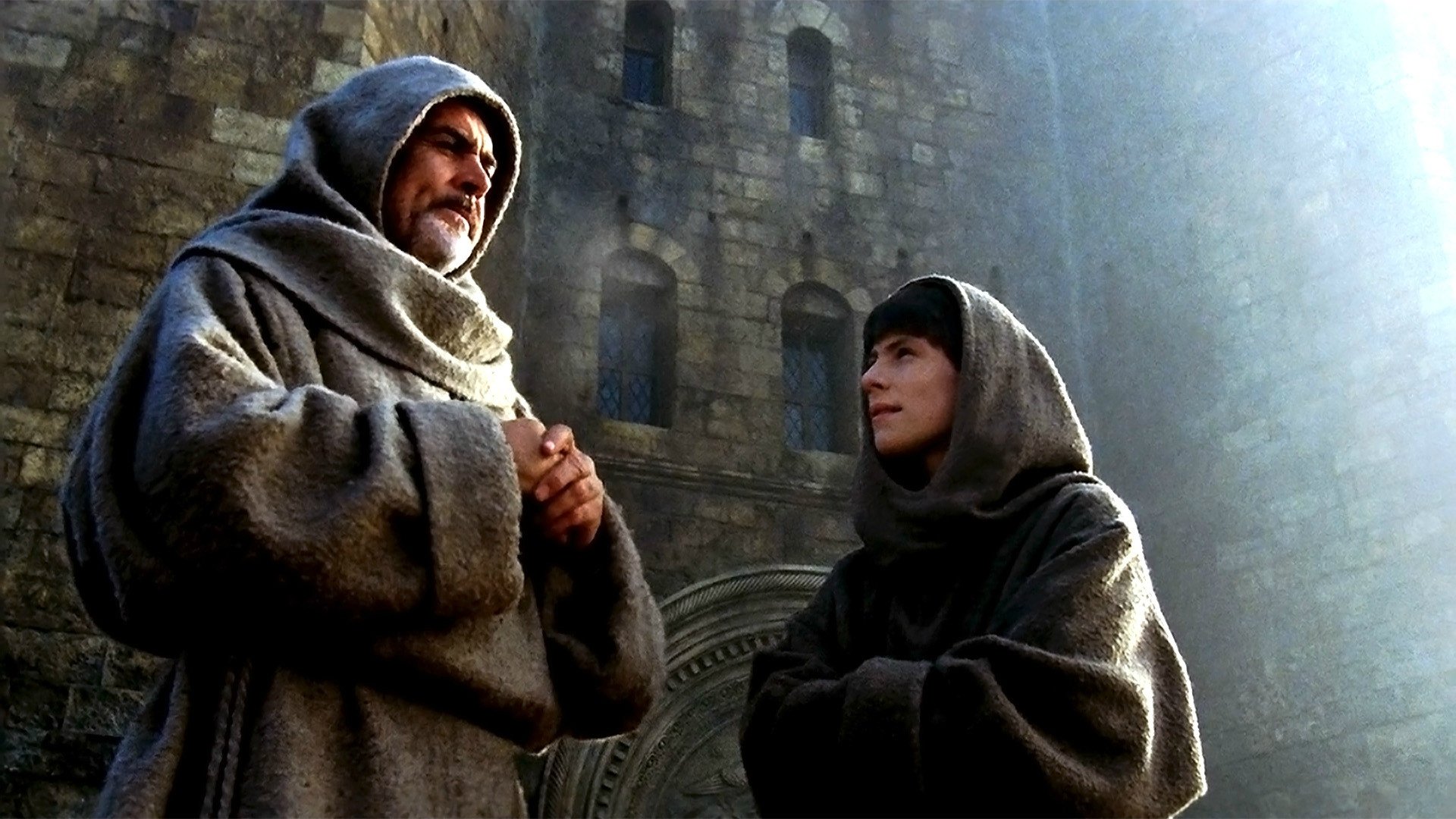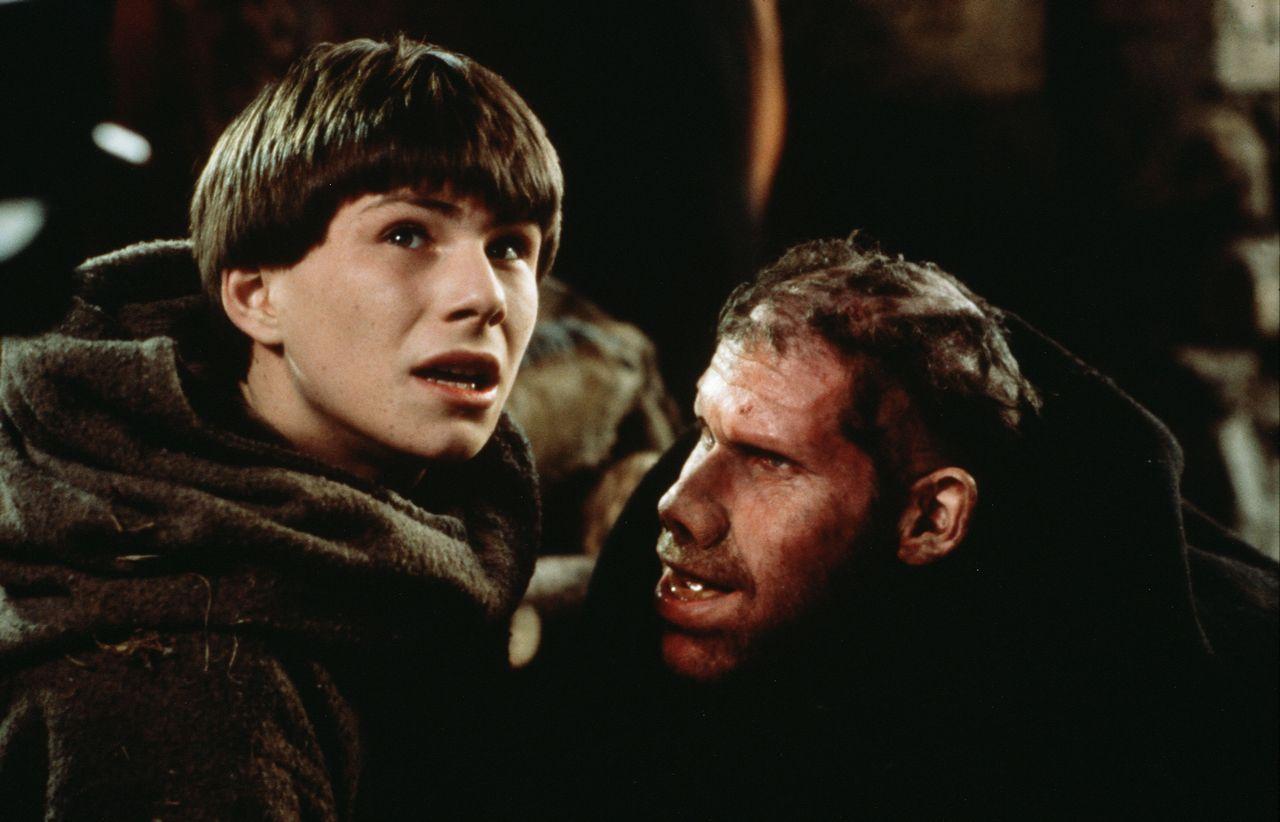Fato curioso: eu sou formada em
Biblioteconomia! Mesmo trabalhando como crítica de cinema, tenho orgulho de
dizer que me formei em 2022, depois de muito esforço. Dito isto, é óbvio que
filmes - e livros - sobre bibliotecários me interessam muito. Por isso eu
escolhi revisitar o filme “O Nome da Rosa”, e também ler o livro, tendo como
foco o retrato do bibliotecário nestas obras.
Fun fact: I hold a degree in Library Science! Even though I work as a film critic, I’m proud to say I finished the degree in 2022, after a lot of hard work. That being said, it’s obvious that movies - and books - about librarians are of utmost interest to me. That’s why I chose to revisit the movie “The Name of the Rose”, and also read the novel, focusing on the portrayal of the librarian in these works.
A história se passa durante sete dias em 1327,
mas é na verdade narrada por um Adso mais velho. Em 1327, Adso de Melk
(Christian Slater) e seu mentor William de Baskerville (Sean Connery) chegam a
uma abadia onde algo terrível havia acontecido: um dos monges havia morrido em
circunstâncias misteriosas. William, sendo um homem sábio, é chamado para
investigar o caso. Logo depois de sua chegada, mais mortes misteriosas
acontecem.
The story takes place during seven days in 1327, but is actually being narrated by an older Adso. In 1327, Adso de Melk (Christian Slater) and his mentor William of Baskerville (Sean Connery) arrive in an abbey where a terrible thing has happened: one of the monks had died in obscure circumstances. William, being the wise man he is, is asked to investigate the case. Right after he arrives, more complicated deaths occur.
O que todos os monges mortos tinham em comum
era alguma ligação com a biblioteca da abadia. A biblioteca é um local
trancado, quase sagrado, e palco de intrigas. O lugar é protegido pelo
bibliotecário-chefe Malaquias (Volker Prechtel) e seu assistente Berengário
(Michael Habeck). É um local não para preservar e obter conhecimento, mas para
manter o conhecimento cativo.
What all the dead monks had in common was that they all had some kind of link with the library of the abbey. The library is a locked, almost sacred, place and the stage for intrigues. The place is protected by chief librarian Malachia (Volker Prechtel) and his assistant Berengar (Michael Habeck). It’s a place not to preserve and obtain knowledge, but to hold knowledge captive.
Na Idade Média, o mais perto das modernas
bibliotecas que existia eram os monastérios, onde livros não eram apenas
guardados, mas estudados e copiados pelos monges. Isto é descrito em “O Nome da
Rosa”, com muitos segredos sendo guardados pelos monges no scriptorium - onde
os livros eram copiados -, especialmente pelos monges que sabiam línguas
estrangeiras como árabe e grego. Os manuscritos eram sobre assuntos religiosos
ou escritos por religiosos, e algumas obras seculares também eram guardadas -
no livro, para servir de exemplo do que não pensar - e até mesmo emprestar e
pegar emprestados manuscritos era possível devido aos monges itinerantes como
William e Adso. No tempo em que se passam o livro e o filme, já havia
bibliotecas sendo construídas dentro das novas universidades.
In the Middle Ages, the closest we had to modern libraries were monasteries, where books were not only kept, but also studied and copied by monks. This is described in “The Name of the Rose”, with many secrets being held by the monks in the scriptorium - where the books were copied -, especially the monks who knew foreign languages such as Arab and Greek. Manuscripts were about religious issues or by religious figures, and some secular writings were kept - in the book, to be an example of what not to think - and even lending and borrowing manuscripts was made possible because of travelling monks such as William and Adso. By the time book and movie are set, there were already libraries being constructed inside the new universities.
O filme define a si mesmo como “um palimpsesto
do romance de Umberto Eco. Palimpsesto significa, de acordo com o dicionário
Merriam-Webster, “material escrito usado uma ou mais vezes depois que o escrito
anterior foi apagado.” É um jeito elegante de dizer que se trata de uma
adaptação mais ou menos fiel do livro. Duas diferenças principais: o personagem
Salvatore (Ron Perlman) não é corcunda no livro; e no filme os inquisidores
ficam por mais tempo, inclusive usando o pátio da abadia para queimar as
pessoas consideradas culpadas após julgamento. Além disso, no filme, William é
ainda mais perspicaz do que no livro, e muitas discussões sobre fé não estão no
filme, embora sejam importantes para a trama.
The movie defines itself as “a palimpsest of Umberto
Eco’s novel”. Palimpsest means, according to the Merriam-Webster dictionary,
“writing material used one or more times after earlier writing has been
erased”. It’s a fancy way to say that the movie is a somewhat-faithful
adaptation of the novel. Two main differences: character Salvatore (Ron
Perlman) doesn’t have a hunchback in the novel; and in the film the inquisitors
stay for a longer time, even using the abbey’s patio to set fire to those found
guilty in the judgments.
Este é um filme que não passa no Teste de
Bechdel, ou seja, um filme que não tem ao menos duas personagens femininas com
nome e que conversam entre si sobre um assunto que não seja sobre homens. A
garota no filme não tem nome, não tem falas nem poder. Isto é esperado de um
filme cuja trama acontece dentro de uma abadia, e considerando toda a história
da exclusão das mulheres pela religião católica. Há inclusive um momento em que
William cita a Bíblia, dizendo: “mais amarga que a morte é a mulher”.
This is a movie that doesn’t pass the Bechdel Test, that is, a movie that doesn’t have at least two female characters with names and who talk to each other about a subject that is not men. The girl in the film is both nameless, lineless and powerless. This is expected, as a movie whose action happens in an abbey, and considering the whole history of female exclusion in the Catholic religion. There is even a moment when William quotes the Bible, saying: “bitterer than death is the woman”.
De acordo com o IMDb, Sean Connery estava em um
momento difícil da carreira quando fez este filme. Mas seu retorno ao sucesso
viria logo: no ano seguinte ele faria “Os Intocáveis”, pelo qual ganharia um
Oscar de Melhor Ator Coadjuvante. Por “O Nome da Rosa” Connery ganhou um BAFTA
de Melhor Ator.
According to IMDb, Sean Connery was in a very low point of his career when he made this movie. But his comeback was just around the corner: the following year he would make “The Untouchables”, for which he would win an Oscar for Best Supporting Actor. For “The Name of the Rose” Connery won a BAFTA for Best Actor.
Para a faculdade, eu tinha de escrever um
artigo de 15 páginas sobre qualquer assunto dentro da Biblioteconomia. Meu primeiro
impulso foi escrever sobre “O Nome da Rosa”, comparando livro, filme e vida
real. Em vez disso, eu escolhi escrever sobre adaptações necessárias para uma
biblioteca atender usuários com deficiência. Eu fico feliz que tenha mudado de
ideia, pois agora posso escrever, num artigo para o blog simples mas - espero -
informativo, sobre “O Nome da Rosa” - o mais famoso romance de Umberto Eco, mas
ao mesmo tempo aquele que ele considerava seu pior trabalho de ficção. Sobre o
filme, em 2013 Eco foi sucinto: “é um bom filme”.
For college, once I had to write a 15-page paper on
any topic of Library Science. My first urge was to write about “The Name of the
Rose”, comparing novel, movie and real life. I chose instead to write about
adaptations a library needs to accommodate users with disabilities. I’m glad I
changed my mind, so now I can write, in a simple but I hope informative blog
post, about “The Name of the Rose” - Umberto Eco’s most famous novel, but the
one he considered his worst work of fiction. About the movie, in 2013 Eco was
succinct: “it’s a nice movie”.
This is my contribution to the On the Job blogathon,
hosted by Hamlette’s Soliloquy and The Midnite Drive-In.








I rented this to watch when it first came out. But although I remember renting it, I don't actually remember if I WATCHED it... Sometimes I was guilty of renting movies and then never getting around to watching them. Ought to give it another go since my only memory is from reading the novel...
ReplyDeleteHave you seen Party Girl (1995) starring Parker Posey? I think it’s a cult classic, which doesn’t surprise me because I think Parker Posey has a cult following of her own! I wish I had heard of the On the Job Blogathon earlier. I think Party Girl would have been a good choice.
ReplyDeleteUmberto Eco considered The Name of the Rose his worst piece of fiction? That was surprising to learn, considering how famous the book is/was.
ReplyDeleteAs for the movie, I saw it when I was very young and didn't get much out of it. But your review has inspired me to try it again – and read the book, too!
I saw this movie back when I was in college, 20 years ago, when I had a roommate who loved Christian Slater. It's not one I have ever felt the desire to watch again, but I enjoyed it, mainly for Slater and Connery.
ReplyDeleteCongrats on your degree--that's awesome! I saw "The Name of the Rose" years ago and remember nothing, but this makes me want to look for it again.
ReplyDelete